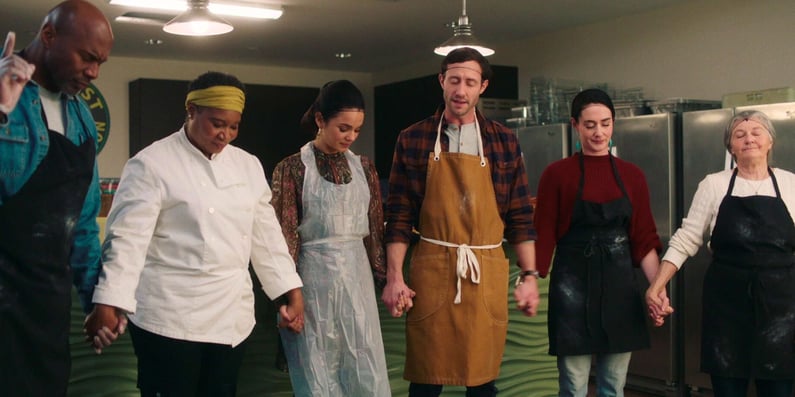The Bible tells us to “pray without ceasing,” but what, exactly, does this mean? It’s a command that Paul writes in 1 Thessalonians 5:17 when he tells the church in Thessalonica to “rejoice always, pray continually, give thanks in all circumstances.” He goes on to tell readers that “this is God’s will” for them under Jesus Christ.
Subscribe to the Great American Pure Flix Insider newsletter for the latest faith & entertainment news
In this article, we will explore the meaning of praying without ceasing and going over some practical ways that you can spend more time with God throughout your entire day.
What Does It Mean to Pray Without Ceasing?
The call to pray without ceasing is clearly one that urges Christians to continuously seek God in their lives. It’s a bold proclamation that, at first glance, might seem almost impossible to live out. But there are some important tips that can help each believer thrive in this area.
Christian commentator Matthew Henry once explained the importance of praying without ceasing, noting that the act and mindset helps keep believers spiritually connected:
A truly religious life is a life of constant joy. And we should rejoice more, if we prayed more. Prayer will help forward all lawful business, and every good work. If we pray without ceasing, we shall not want matter for thanksgiving in everything. We shall see cause to give thanks for sparing and preventing, for common and uncommon, past and present, temporal and spiritual mercies. Not only for prosperous and pleasing, but also for afflicting providences, for chastisements and corrections; for God designs all for our good, though we at present see not how they tend to it. Quench not the Spirit.
This explanation is clear: prayer matters — and it doesn’t only have value during the tough times when we seek God to guide us through our issues. Prayer should be an ongoing process that we engage in as we face various issues, victories and decisions.

Of course, many of us are so busy that we let the day pass without spending a great deal of time in prayer. With that in mind, how can we learn to be in continual prayer?
5 Ways To Pray Without Ceasing
1. Pray in the Morning
“Trust in the Lord with all your heart and lean not on your own understanding.” -Proverbs 3:5 (NIV)
One excellent habit that not only starts the day out right but can also help keep one’s mind focused on the Lord is to always start the day with prayer. A good habit is to turn to God before one’s feet even hit the floor, asking Him for help and guidance during the day ahead.
Daily morning prayer can be a pivotal and important practice that can help begin the day with positivity and a focus on God’s word. So what kind of prayers should you say at the beginning of the day?
We have some encouraging morning prayers you can pray with daily. The morning is a perfect time to give thanks to God for the day ahead, ask for the strength or courage to face whatever may comes your way that day, or even ask for protection and guidance throughout the day. Each new day is a day to give thanks and give our love back to God!

2. Center Prayer Around Meals
“The eyes of the Lord are on the righteous, and his ears are attentive to their cry.” -Psalm 34:15 (NIV)
Another way to persist on the journey to try and pray more times a day is to ensure that prayer unfolds before all meals and snacks — an outstanding way to keep consistent and to cultivate a spirit of gratitude.
Since meals and snacks unfold throughout the day, they are good benchmarks and reminders that can help consistently connect individuals to the Almighty. The Bible makes it clear that saying grace is an incredibly important act before eating a meal.
It's because of Him that we are able to have the food in front of us; mealtime is the perfect time to give thanks and acknowledge that we know not everyone has the same privilege as us. We have tips on how to build a mealtime prayer tradition as well as share some great mealtime prayers you can use in continual prayer. Mealtime is the perfect time to give thanks for our food and those we get to share it with, pray for the poor, show our love for God and bless those who prepared the food.
3. Focus on Joyful Prayer
“Give thanks in all circumstances; for this is God’s will for you in Christ Jesus.” -1 Thessalonians 5:18 (NIV)
Many people fall into the trap of only thanking God when times are tough. In moments of desperation it makes sense to call on the Lord, but what about times of victory?
It’s important to use joyful moments as opportunities throughout the day to thank God and also pray in times of consolation was well as desolation. God doesn't want us to just run to Him in the hard times, He also wants to celebrate the good times with us as well.
These catalysts can range from thanking God for the simple things you observe in His creation to remembering to honor Him when you encounter personal successes. In "Running the Bases," baseball coach Luke runs the bases and bends one knee to pray after every game - regardless of it being a win or loss. This example of continual prayer shows how dedicated Luke was to his faith and prayer life.

4. Pray After a Mistake or Error
“Repent, then, and turn to God, so that your sins may be wiped out, that times of refreshing may come from the Lord.” —Acts 3:19 (NIV)
Sin and personal errors are also a time to reflect, while seeking change and forgiveness. Continual prayer after recognizing when we sinned or made a mistake also helps us to become more self aware of our sinfulness and what leads us to sin.
In "Pardoned by Grace," Scott Highberger continually finds himself in trouble with the law. While serving his time, he is able to spend time with God and learn to ask for the forgiveness of our Lord. Though it takes him a long time to continually ask for God's mercy and grace, he eventually is able to keep his good habits of prayer and change his troubling ways.
We can use the time of prayer to reflect on what we did wrong, how we can prevent doing the same thing in the future, and ask for forgiveness from God as well as anyone else we might have done wrong.
READ ALSO: 5 Healing Prayers for Forgiveness
5. Pray at the End of the Day
In peace I will lie down and sleep, for you alone, Lord, make me dwell in safety. - Psalm 4:8 (NIV)
Praying at the end of our day is not only a great way to unwind but to also thank God for the day He gave us, the blessings we had during the day and ask for a restful sleep.
In "Going Home," hospice nurse Charley unwinds every night after work by sitting on her back porch and talking to God. Charley's prayers and petitions are a great example of how we can add time of prayer into our day and unpack what happened that day by talking to God. This action can lead to a habit of continual prayer and seeking God when we need to talk through the events of the day.
Nighttime prayers can really be a chance to tell God exactly what the events of the day made you feel. It can be a time to ask for Him to ease a worried mind or dispel fear. It can be a petition for help - either for yourself or for someone you know who might currently be suffering. Evening prayers are a great time to spend with God asking for His guidance and for strength the following day.

6. Learn to Listen to God
The more times throughout the day you spend in prayer, the stronger your relationship with God gets. And with that, the better you're able to learn to listen to God and discern when you're hearing His voice.
It isn't always easy to do - but sometimes times of prayer means just sitting in silence with God. No phones, no music, no distractions - just sitting there and asking God to come into your heart and speak to you.
In "The Abigail Mysteries," Abby is trying to get back into the habit of prayer, which is something she strayed from because she couldn't feel God's presence in her life. With her Poppa's guidance, she's able to slow down and truly take the time to sit in silence with God. You'll have to watch the movie and find out how He answered her prayers!
Understand the Purpose of Praying Without Ceasing
Circling back to the Bible verse we mentioned at the beginning from the first letter to the Thessalonians, the most important element is to recognize why Paul wants believers to pray without ceasing. According to theologian John Piper it all boils down to fostering a dependence on God, to pray to God repeatedly and often – and to not give up, no matter what happens.
“So, the key to rejoicing always is to pray continually; that is, to lean on God all the time and call to him repeatedly and often,” Piper explains. “Never give up looking to him for help, come to him repeatedly during the day, and come often. Make the default state of your mind a Godward longing and a Godward thankfulness.”
So let us remember to pray without ceasing. Doing so will only increase our reliance on God and strengthen our relationship with Him. To be encouraged in your faith, subscribe to the Great American Pure Flix Insider email newsletter.



COMMENTS